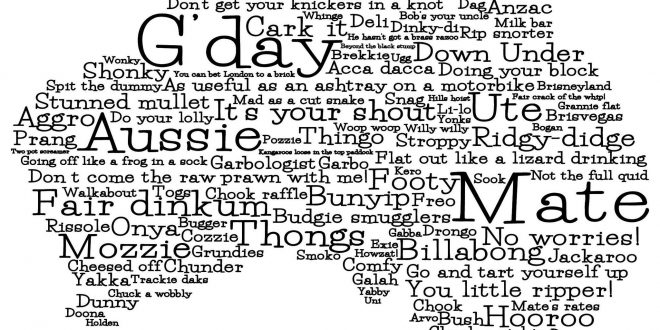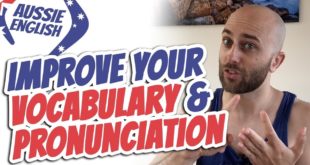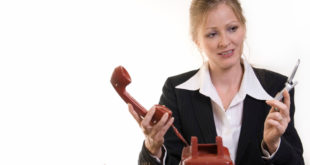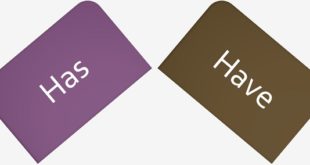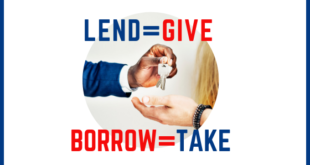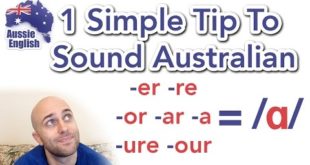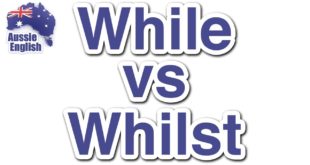16 Aussie Slang Terms. Do I Use Them?
G’day guys what’s up?
I got a postcard today in the mail from listener Juliana.
So she sent me a postcard with a few different slang terms and expressions from Australia, and I thought it would be the perfect chance for me to break these down and talk about whether or not I actually use any.
Let’s go.
Alright let’s get it started.
1. G’day mate
The first one “G’day mate”.
“Pleased to make your acquaintance.”
This is definitely one that I use a lot.
And I’m sure you all know this “G’day mate. How’s it goin’ mate? G’day. G’day mate!”.
2. He’s blotto
The next one “He’s blotto”, “Inebriated beyond the capacity to stand up”, meaning he is so drunk he can barely stand or he can’t stand “He’s blotto”.
This is one that I hadn’t heard of until I read this postcard.
It could be said but I have never used this.
I would just say that “He is wasted. He’s wasted. He’s so drunk. He’s wasted.”
3. You little ripper!
“You little ripper!” meaning “Words of praise failed me”.
As in I don’t know what else to say aside from “You little ripper” as in, amazing, great job, you little ripper.
This is one that I would hear quite a lot, and I’m sure a lot of more Australian Australians in air quotes would say “You little ripper” but I probably wouldn’t use this in my day to day language.
4. Rack off!
“Rack off!”. “Rack off!” is one that I used to hear when I was younger, meaning “Go away. Leave me alone”.
So “Your presence is no longer required.” according to this postcard.
“Rack off!”.
It’s a somewhat politer way of saying “F off” or you know “F-U-C-K off” if you wanted to be really rude but “Rack off!”, I probably wouldn’t use this that often but I wouldn’t be surprised if I heard it and I would know exactly what I meant. So more Australian Australians would probably use this, yeah, in slang.
5. Fair dinkum
“Fair dinkum” meaning “Of course I’m telling the truth. I’m fair dinkum”. “Fair dinkum”.
This can mean a few things and it’s something I would probably use from time to time.
I would use “Fair dinkum”. You can use it to mean that you are “True, legit, the real deal.”
“I am fair dinkum”. But you can also say it as, like, “Fair enough” or “Oh really” “Really?”.
So you can just say “Oh fair dinkum? “Fair dinkum!” if someone tells you something that surprises you a little bit.
6. Pull your head in!
“Pull your head in!”.
So you may be correct in your assertion but shut up.
As in “You may be right, but be quiet shut up”.
“Pull your head in”.
This is one that I would probably use but it’s hard.
This one probably for me would mean pull your head in, as in, “Stop being an idiot! Stop mucking around!”.
It could be like someone’s trying to… Alright say you’ve got a child at school and he’s slacking off and his marks are going down hill so he’s not doing very well.
He’s not doing very well.
He’s getting C’s or D’s.
He’s passing but it’s not great.
You could say to him “Dude, pull your head in. Stop wasting your time. Stop mucking around. Do the right thing. Work hard. Pull your head in!” or if someone was being nasty to someone you could just say “Mate cut it out! Pull your head in! Stop it!”.
7. Wanna rage?
“Wanna rage? Do you want to rage? Wanna rage?”.
This means you want to drink a lot of alcohol.
So would you like “To drink large amounts of alcohol with me until we both drop” according to this postcard.
“Wanna rage?”.
I wouldn’t use this, personally.
I… that wouldn’t be my assumption either.
Someone said, “Do you want to rage?” that would to me… that would be me thinking “Are you asking if I’m going to rage?” as if to get angry to become really full of rage or even “Did you want to fight me?”. “Do you want to rage?” I don’t know.
That would be the feeling I get but it’s not something I use.
8. Bloody oath!
“Bloody oath!”. “Bloody oath.!”
“I’m in total agreement with you.”
“Bloody oath, mate. Bloody oath!”
This is relatively colloquial, very slangy.
I would probably not use it very often but I definitely would use it from time to time.
So… and it’s something you’re going to hear a lot of Australians say.
“Bloody oath, mate. Bloody oath”.
9. Your shout
“Your shout”. “Your shout.”
Now I know what this means and I use this as well quite a lot.
In fact I think most Australians would use this in day to day language.
“Your shout” if you value your wellbeing you should buy me a drink.
Yeah, it’s not really a threat.
Like that sounds on the postcard.
It’s more it’s your turn to pay or it’s “Your shout” meaning can you shout me the next round of drinks, the next meal the next lift to work “It’s your shout”.
It’s normally with paying something so if you have to pay for something it’s your turn, because last time I paid for all of us whether it was a drink or something to eat or the petrol for the car it could be anything you’ve paid for.
That was “My shout” and if it’s your turn it’s “Your shout”.
10. Go on
“Go on”.
“Go on” means quite a few things, but according to the postcard “I’m not entirely convinced you know what you’re talking about”.
So I guess from this point of view it would be if someone was telling you something and you were a little skeptical you could be like, “Go on.” or maybe they mean. “Go on. Go on”.
Yeah see. Personally I wouldn’t. I can’t go on.
I would say is like have a try “Go on, mate! Go on give it a go! Go on, have a go. Go on.”
That would be more what I would use “Go on” for.
I don’t think I would use it like this for being skeptical about what someone was saying.
11. You pong
“You pong”.
Now I do… I know what this means but I probably wouldn’t use it.
“You pong” is “Dear me. And we do smell, don’t we.”
That’s an interesting way of phrasing it because they’re using the collective “We” as opposed to “You” but it’s referring to that person that you’re talking to is and you smell.
“Dear me! Oh my gosh! We smell a little bit, don’t we?”, or as in like “You smell a little bit, don’t you?”.
“You pong”.
Yeah I would know what this means but I wouldn’t use it personally.
“You pong! Far out you pong.”
12. Whadayawant?
“Whadayawant?”.
I think I’ve done an episode on this.
I know “Whadaya”, “Whadayawant?”.
“Might I inquire about your needs? Might I inquire about your needs?”
What would you like?
What would what do you want.
“Whadayawant?” is a very Australian sort of contraction of “What do you want?” all the way down into sort of this one word of “Whadayawant?”.
“Whadayawant?”.
I would use this all the time.
I use those kinds of contractions of all those words a lot in English.
13. To have a chunder
“To have a chunder”.
Now this I would use “To have a chunder.”, however, this one I would use around other Australians, because they would know what I meant and foreigners would be like “Ewhh?”. “Chunder” is to vomit, to munt, to throw up, to spew.
We’ve got a lot of words for this.
“Chunder. Chunder”.
“To have a chunder” is for you to go and have a spew, have a vomit, have a throw up.
You’re spewing up.
And what does it say here “The delicate act of regurgitation.”
There you go, “The delicate act of regurgitation”.
“To have a chunder.”
14. Give it a go ya mug!
“Give it a go ya mug! Give it a go ya mug!”, and this according to the postcard means “Are you perhaps incapable of performing this act?”.
So I guess it’s sort of like “Try it man. What’s wrong with you? Give it a try. Give it a go.”.
“Give it a go ya mug”.
I don’t think I would ever use “Mug” as like a I guess a term of endearment here for another person, “Mug”.
I think in English in Australian English particularly… maybe all kinds of English, “Mug” would refer to someone’s face.
I think so, like, “Oh, you’ve got it all over your mug.”
But even then, I wouldn’t really use it.
“Give it a go”.
I would use that all the time.
“Give the go ya mug”?
I wouldn’t say that.
15. How ya goin’?
“How ya goin’?”. “How ya goin’?”.
“May I inquire about your welfare.”
“How ya goin’?”. “How ya goin’?”.
You guys know that I use this a lot.
“How ya goin’?”.
This is a very very Australian greeting as well.
So definitely learn this one if you’re coming to Australia because people are going to say this to you all the time, and they’re not necessarily going to want to hear what you’ve actually been going through, they’re just saying hello “How ya goin’?”, and you would just say “Yeah good. Not bad.”
16. You drongo
Last one.
Last but not least “You drongo”. “You drongo”.
“You really are rather dim witted person”.
And if you’re dimwitted it means that you are not very smart.
So you are very witty. It’s dim like as if you had a bright light dimmed down, so the light intensity sort of dropped down, it became dim, if your wits were to become dim you’re becoming dimwitted and you are dimwitted.
You are very unintelligent.
You’re not very smart. Dimwitted.
So anyway, “You drongo”, this is the kind of thing that is used a lot, and my father, my father would use this a lot, and on me in particular.
So if I did something stupid or something silly like say I was trying to build something outside and I was hammering above my head and something came down and smacked me, you know, because I was being clumsy.
He could say, “Dude, you drongo! What are you doing you drongo? You drongo.”
Anyway, that’s the Aussie gentleman postcard.
I hope you guys liked it.
I hope guys get a bit of a sense for how I use these slang terms and the ones that I don’t use.
But, yeah, there are a lot here that are definitely Australian that you could learn, but there are also a few that are probably not very useful or not anymore.
They might have been once upon a time when this was made.
Anyway, thanks Juliana so much for the postcard.
I really appreciate it!
And in the next episode I will do An Aussie Sheila, the girl’s version.
See ya guys!
 ایرانیان استرالیا Australia Iran بزرگترین جامعه ایرانیان ساکن استرالیا Australia Iran
ایرانیان استرالیا Australia Iran بزرگترین جامعه ایرانیان ساکن استرالیا Australia Iran

